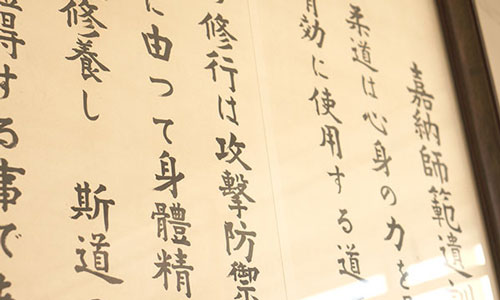What is “Seiryoku-Zenyo”?

Seiryoku-Zenyo (精力善用) is commonly translated as “maximum efficient use of energy.” This principle lies at the heart of judo and applies to every aspect of life. It means making the best possible use of both physical and mental energy to achieve a worthy goal.
In judo, this principle guides both attack and defence, as well as the teaching process itself. Simply put, Seiryoku-Zenyo can be understood as the most effective use of one’s mind and body. In this way, judo techniques (waza) become not only physical tools, but also expressions of an educational and philosophical path.
Kano considered this principle to be a fundamental teaching of judo—one that extended far beyond the dojo. To use energy efficiently is to act for a greater good. As he explained: helping the continued development of society qualifies as “good,” while hindering it is “bad.”
Progress, therefore, depends on cooperation. Kano described this as Sojo-sojo (helping one another) and Jita-Kyoei (mutual prosperity). Both are part of the broader good and reflect what he called “the fundamental wisdom of judo.”
Kata and randori are made possible through this principle, as it guides the methods of attack and defence. When applied to physical development, it becomes a form of physical education. When applied to the pursuit of knowledge, it becomes a method of self-improvement. And when applied to society—such as to daily needs, interpersonal relationships, duties, and governance—it becomes a way of life.
Kano emphasized that judo was not merely a martial practice in the dojo, but a guiding philosophy that could shape human society. He reflected:
Through the study of traditional jujutsu kata and randori, I came to realise this greater meaning. Accordingly, my teaching also followed this path. I saw the value of teaching kata and randori not only as martial arts and physical training, but also as a way to help individuals and society. Those who master the principles of judo can apply them to all aspects of life. That is the true way of studying judo as I envisioned it.
He concluded:
Around the world, many people live by the principles of judo without even realising it. If judo, as I intended, becomes embedded in society, then people’s actions will naturally reflect judo. I believe that if more people understand its true foundation, judo’s philosophy can guide their lives. I urge you to make great efforts to bring this into the world. – Jigoro Kano
What is “Jita-Kyoei”?
Jita-Kyoei (自他共栄), or “mutual welfare and benefit,” is the second central principle of judo. Kano believed that no one lives in isolation, and that the well-being of individuals and society are inseparably connected.
He explained:
As long as we live together in society, each member must function in harmony with others. Nothing is more important than achieving mutual prosperity. If everyone acts with a spirit of cooperation, each person’s efforts will benefit not only themselves, but others as well—and this shared progress will bring mutual happiness.
Self-serving actions, Kano warned, ultimately lead to conflict, inefficiency, and even destruction. True advancement comes from recognising our interconnectedness and acting with responsibility toward others.
Acting solely for one’s own interests creates opposition and ultimately results in failure. There is no other path but Jita-Kyoei, in which all people contribute to society and prosper together.
To illustrate the concept, Kano offered a metaphor:
Imagine three people travelling together. One wants to go to the mountains, another to the sea, and the third wants to stop and rest. If they each insist on their own path, the journey ends. But if they cooperate and agree on a shared destination, they can move forward together. This is Jita-Kyoei.
Kano believed this principle could reshape nations:
If we stop wasting energy on meaningless conflict and instead follow the principle of Jita-Kyoei, the vitality of our society will multiply. Culture will flourish. Prosperity will grow. And international relations will improve. Jita-Kyoei is not idealism—it is a practical path forward for all humanity.
He closed with a call to action:
Raise the banner of Seiryoku-Zenyo and Jita-Kyoei—principles grounded in universal truth—and walk forward hand in hand with the people of the world.
— Jigoro Kano